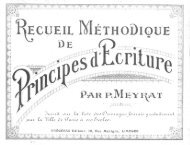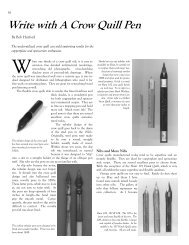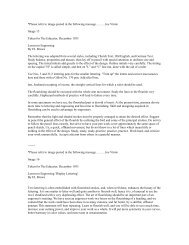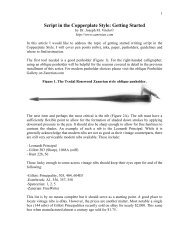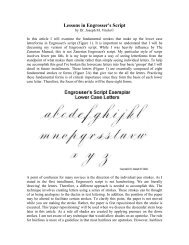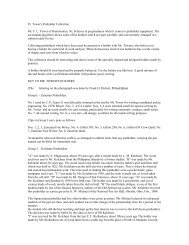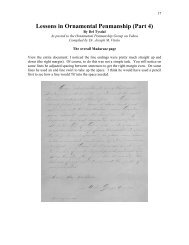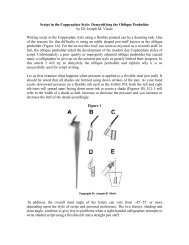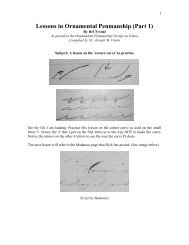The Educator (Volume 45) - IAMPETH
The Educator (Volume 45) - IAMPETH
The Educator (Volume 45) - IAMPETH
You also want an ePaper? Increase the reach of your titles
YUMPU automatically turns print PDFs into web optimized ePapers that Google loves.
14<br />
Handwriting Contributes to Business<br />
Talk given at National Association of<br />
iship Teachers and Supei-visors.<br />
Handwriting always has contributed<br />
to business, does now, and probably<br />
always shall. It has not been so<br />
many years ago that we began to hear<br />
from many quarters that handwriting<br />
was losing its importance since the<br />
typewriter had assumed such a prominent<br />
position in both our business<br />
and our social life. Back in other<br />
days, and some of us ai'e old enough<br />
to remember them, every pupil graduating<br />
from a commercial course in<br />
either a public or a private school<br />
was required to write a good hand.<br />
Ability to write a good muscular<br />
movement hand was one of the qualifications<br />
for every commercial teacher.<br />
In fact, some of the other qualifications<br />
were overlooked if the teacher<br />
was a good penman. Today the incoming<br />
commercial teacher, in too<br />
many cases, can not write a legible<br />
hand, and neither can the outgoing<br />
commercial graduate.<br />
This situation is probably due to<br />
several things. <strong>The</strong>re has been a<br />
failure to properly stress in the school<br />
the importance of good handwriting<br />
in the business world, and there has<br />
been a definite loosening up on our<br />
former strict standards. This is due,<br />
I believe, to the fact that so many<br />
communities have put in a program of<br />
handwriting in the grades. <strong>The</strong> commercial<br />
teachers and the school administrators<br />
have jumped to the conclusion<br />
that since the grades were now<br />
doing the job they no longer needed<br />
to concern themselves with it. <strong>The</strong>n,<br />
too, many believed the fallacy that<br />
handwriting was becoming a lost art.<br />
If this were not true, why would<br />
we almost always see on business<br />
forms and papers this slogan: "Please<br />
print name and address" ?<br />
In looking back to the days of high<br />
standards, I wish to recall the days<br />
of some seventeen years ago, when I<br />
was head of the commercial department<br />
of the high school in the city of<br />
your President. We had a teacher of<br />
handwriting in the commercial department,<br />
and she could teach penmanship,<br />
if nothing else. Seventy-five<br />
to eighty per cent of all the commercial<br />
pupils secured handwriting certificates,<br />
and those who didn't were<br />
not bad writers. I have looked back<br />
on this experience with the belief<br />
that this was about as ideal a situation<br />
as we could hope for.<br />
Those of us in business education<br />
are constantly listening to the businessman's<br />
lament: "Your product<br />
can't figure, can't spell, and can't<br />
write a legible hand". Judging from<br />
the happenings of the past ten years,<br />
it is doubtful if the businessman is any<br />
too good at figures. A number of<br />
studies seem to prove that pupils spell<br />
By Clyde B. Edgeworth, Supervisor<br />
of Commercial Education.<br />
Baltimore, Md.<br />
Clyde B. Edgeworth<br />
better today than they ever have, but<br />
when we come to legible handwriting,<br />
I am afraid we shall have to admit<br />
that our pupils should be sent out<br />
into business life with much better<br />
handwriting than they now have.<br />
While pen bookkeeping is rapidly being<br />
replaced by machine bookkeeping<br />
except in the smallest offices, and all<br />
business correspondence is typewritten,<br />
there is still a tremendous<br />
amount of pen and pencil work to be<br />
done. This must be legible and rapidly<br />
written. Good handwriting is as<br />
important now as it ever was, and<br />
its importance will not lessen in your<br />
day or mine.<br />
In many cities and towns, entirely<br />
too heavy a burden is placed on the<br />
handwriting supervisor. She is given<br />
too many schools to cover and not<br />
enough assistance to do a thorough<br />
job, so she does the best she can and<br />
keeps her faith in miracles.<br />
If handwriting is not making its<br />
proper contribution to business, just<br />
what can we do about it? To begin<br />
with, we can all try to sell our school<br />
authorities on a good handwriting for<br />
every pupil. We can also try to sell<br />
them the idea of being united in their<br />
demands on the training schools in<br />
training their outgoing teachers as<br />
well in muscular movement writing<br />
as they do in other subjects. <strong>The</strong>n<br />
the work of the supervisor would be<br />
something entirely different from<br />
what it is now. With every classroom<br />
teacher a good penman and a<br />
good teacher, supervision would not<br />
be as important as at present. <strong>The</strong><br />
supervisor could then devote a part<br />
of her time to bringing to her teachers<br />
the latest methods and thought in<br />
the field, she could improve and set<br />
up better grade standai'ds, she could<br />
do the many things necessary to im-<br />
prove the entire work in her field, and<br />
she could keep the school administrators<br />
and the public handwriting conscious.<br />
You have your grade scales and<br />
you make a serious effort to keep<br />
pupils at grade level. <strong>The</strong> whole picture<br />
changes, however, when the pupil<br />
enters the high school. Here the<br />
teachers are not particularly interested<br />
in the handwriting, as long as<br />
they can read it without too much effort.<br />
Pupils who are not too well<br />
grounded in this skill often slip back.<br />
I contend that a pupil who v^'ites<br />
below his grade level is down in this<br />
subject just the same as he is down<br />
in any subject in which he is below<br />
grade level, and something should be<br />
done about it. In my own situation,<br />
I have advocated for years that a<br />
reservoir class be established in every<br />
junior and senior high school in the<br />
city and that it be conducted after<br />
school the same as any other make-up<br />
subject. I have recommended that a<br />
good penman be selected from the<br />
school—one at least can usually be<br />
found in the commercial department<br />
—<br />
that he be given the necessary training<br />
in scoring and in methods, and<br />
that he be placed in charge of this<br />
class. Fui-ther recommendations have<br />
been made that every teacher in a<br />
school be made acquainted with the<br />
plan and purpose, and that when he<br />
comes across a paper which is not<br />
satisfactory, it be passed to the reservoir<br />
class teacher for scoring.<br />
Pupils below grade level should be<br />
assigned to the reservoir class. Upon<br />
attaining grade level they should be<br />
excused. If they again slip, they<br />
should be reassigned to this class.<br />
This, I believe, would solve the problem<br />
not only for the commercial<br />
pupils but for all pupils. We are not<br />
interested in turning out professional<br />
penmen, but I believe we would do<br />
well to take as our slogan: "Write<br />
at grade level". When our commercial<br />
pupils enter the business life of<br />
the community with good handwriting,<br />
then they are at least making one<br />
real contribution towards the improvement<br />
of that business life, and<br />
we can feel that we are doing our job<br />
just that much better.<br />
Let us hope that the situation never<br />
gets as serious as it was in the case<br />
of Horace Greeley. We are told that<br />
he was a notoriously poor penman and<br />
was unable to read his own writing<br />
once it got cold. Greeley and Mark<br />
Twain were friends and regular correspondents.<br />
It is said that Mark<br />
Twain carried Greeley's letters around<br />
for days unopened. When asked why<br />
he didn't open and read them, he replied<br />
that he loved to think that he<br />
had an unread letter from a very dear<br />
friend.<br />
I thank you.



